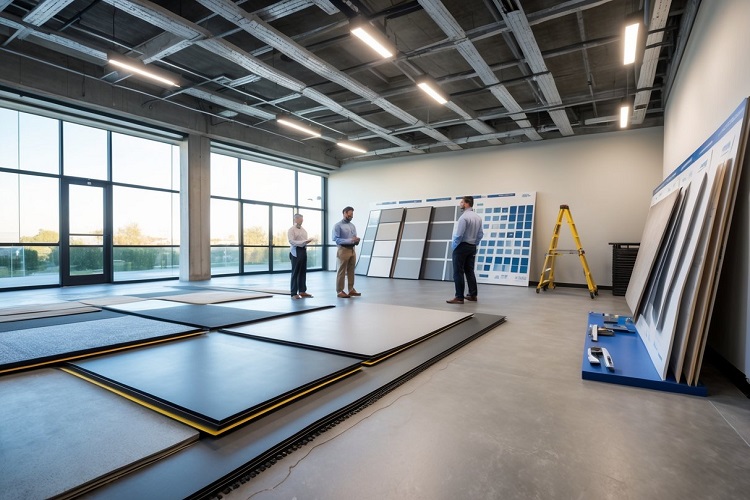When you select flooring for a commercial space, durability is essential, not optional. Whether you’re outfitting an office lobby, restaurant, retail store, or warehouse, the best heavy-duty flooring will resist wear and tear, withstand constant foot traffic, and maintain a professional appearance for years to come. However, with such a wide variety of material options available, which one is the right choice? Here’s what you should consider when selecting the next heavy-duty flooring for your commercial space.
Table of Contents
1. Consider Maintenance and Cleaning
Ease of maintenance is a significant factor when dealing with commercial flooring. You should aim for a surface that cleans easily, resists stains, and won’t require constant upkeep. Certain materials may look appealing but require constant buffing, sealing, and refinishing, ultimately costing you time and money in the future. There are low-maintenance options to consider. One option is luxury vinyl tile, or LVT, which can provide a stylish appeal in high-traffic areas. Another is epoxy-coated concrete, which can resist water, scratches, and chemicals.
2. Assess the Type of Traffic
Begin the selection process by assessing how your space will be utilized. Will it be exposed to chemicals and moisture? Will there be constant heavy equipment, rolling carts, and foot traffic? Bustling auto repair shops have seriously different needs from quiet law offices. Pick a flooring material rated for the kind of traffic and daily volume it will face. Polished concrete is ideal for warehouse and industrial settings, but porcelain tile strikes a balance between durability and a polished look, making it suitable for restrooms and lobbies. Vinyl composition tile, or VCT, works well for offices and schools.
3. Prioritize Safety and Slip Resistance
In commercial spaces, safety isn’t negotiable. Flooring must have proper slip resistance, especially in areas prone to moisture or spills. Entryways, bathrooms, and kitchens need slip-resistant finishes to prevent workplace injuries. Certain kinds of flooring, including safety-rated tile or rubber, are specifically designed for underfoot comfort and traction.
4. Evaluate Aesthetic and Branding
Your commercial space flooring is integral to the first impression on customers walking through your doors. It needs to create a good ambiance and complement your branding. Retail stores might want wood-look tile or vinyl for warmth, but polished surfaces and bold colors reinforce modern aesthetics. Rubber flooring is also an option for comfort and a customized look.
5. Think Long-Term Costs
Don’t just focus on upfront costs; consider the total cost of ownership. Cheaper flooring may need replacement in just a few years, but materials that are slightly more expensive upfront may last decades with minimal upkeep. Calculate your potential return on investment based on repair costs, cleaning needs, and expected lifespan. Don’t just choose the cheapest price today, but look at what will give you the best return on your investment in commercial flooring.
Balance Many Factors
Selecting the ideal heavy-duty flooring for your commercial space involves striking a balance between safety, aesthetics, maintenance, and functionality. Consider long-term value, and evaluate the uses of your current commercial space. Consult a flooring specialist to identify your options and narrow them down to those that meet your needs, budget, industry standards, and local building codes and regulations.

